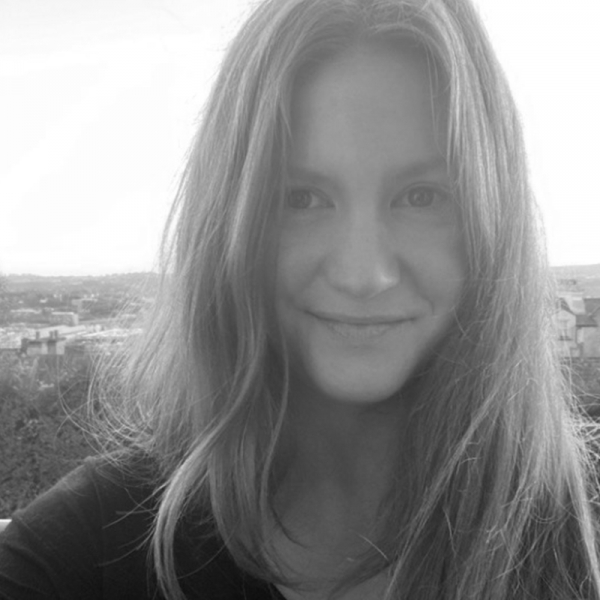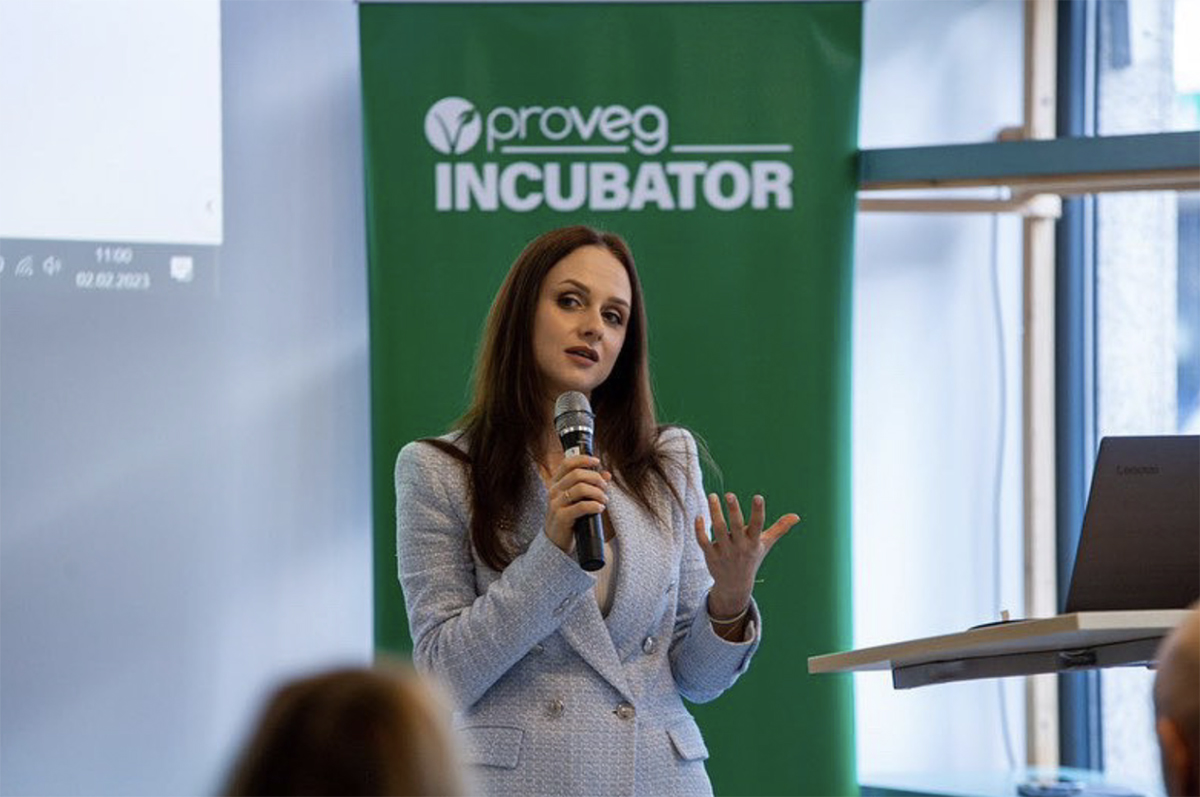March 9, 2023
Bronwen Evans speaks to Green Go’s Bogdana Leonova about operating in wartime, its recent funding through the ProVeg incubator and the key to creating plant-based products that appeal to all.


Green Go entered the competitive plant-based market in 2021, bringing with it the first plant-based steak to be produced in Ukraine, using a 3D marbling technique that the company claims looks and tastes like real marbled beef. Stanislav Lutskovych, co-founder of West Mills, a plant-based alternatives distributor in Ukraine, said of the product: “Globally, there are almost no equivalents of this steak.”
Green Go was conceptualized in 2020 by founders Aleksandr Panasiuk and Yuriy Kyshnir, with the aim of creating plant-based foods that are as tasty as they are accessible. Along with creative director Bogdana Leonova, the team has over 15 years of experience in food technology and ingredients.
Despite the ongoing war in Ukraine, the company has taken significant steps to expand, with plans for a new factory near the Polish border that will allow for it to begin supplying to the rest of the EU and further afield.
Green Go uses pea protein combined with wheat and soy protein to create its products and is also working to incorporate fava beans in the future.
In 2021, the founders expressed that "The best plant-based alternatives can be created by those who remember the taste of meat."
“When you know how to create the real meat product you can create something similar…and something very attractive to the consumers.” explains Bogdana Leonova, Ph.D, Creative Director at Green Go. “I would like to say that we are not vegans. I am a flexitarian. From the beginning of this project I have started to eat less meat, absolutely. I started to look at this normal ecological direction like homework”.
She goes on to explain that the aim behind Green Go’s products is consumer inclusivity and to cater to mainstream diets:
“For me it was very hard to reduce meat in my diet and I understood that this problem is really common for other people. Some people really want to change the world but it’s really hard for them to change their diet so dramatically...The main aim of our investigations was to create plant-based products that were very similar and tasty for meat eaters because …vegans alone cannot save the world. We need to have an ecological army”.
Green Go has focused from the very beginning on showing consumers that reducing your meat intake doesn’t mean just eating salad; it can be a nutritious and fulfilling experience that helps the planet and our health.
“They can also eat a burger made from plants and, if it will be nutritious and tasty enough, why not? Even if they eat it once a week it will be a great win for the planet. The vision of the company is a wonderful green world without cruelty and climate change. And our mission is based around this vision.”
Green Go has been advancing its vision during the ongoing Russian invasion of Ukraine and, Bogdana explains, has even drawn strength and resilience from the experience.
“When the war started one year ago, we stopped our work for a month but then we continued with everything. A lot of emotions changed inside Ukrainians and I am no exception. When the war comes to your country you understand that nothing is impossible, and you understand that you have created something great and innovative and we started to have a very big dream to share our knowledge with the whole world and show that Ukraine can also be a good player in the plant-based area and that our scientists even during the war can lead and work and even be a plant-based example of braveness”.
“When the war comes to your country you understand that nothing is impossible, and you understand that you have created something great and innovative”
The company even sees itself at a competitive advantage at this time thanks to the comparatively lower operating costs seen across Ukraine than in some other areas of the EU. Green Go explained earlier in the year:
“Some investors are scared to put their money in Ukraine, as the war is ongoing. However, we believe in our victory and that war is not endless. The war is a frightening time, but it is also a time for opportunity for brave investors”.
Bogdana indicates that one of the most complicated aspects of operating during wartime is the ever-present possibility of attack: “But a lot of cities are alive,” she explains. “If you come to Kyiv before the war siren you wouldn’t even understand that it is wartime”.
The company’s plans for expansion are a result of funding from the ProVeg Incubator investment program, which is designed to support mission-based startups that “have the potential to remove animals from our global food system.” The organization is dedicated to transforming the way we eat through the development of plant-based and cultured food, focusing on areas such as fermentation, functional ingredients, cell cultivation, and molecular farming, as well as supporting the tech to enable these processes.
The program is especially interested in startups developing egg, seafood, and chicken alternatives and, at the recent incubator event in Berlin, Green Go was ready to impress, presenting plant-based alternatives to shrimp, salmon burgers and calamari, as well as filet mignon and ribeye steak.
“We took our place in an exhibition for IFFA in Frankfurt in May,” explains Bodgana. “We had a booth there over four days and prepared our products for tasting sessions. It was complicated because we had no possibility to fly, so we had to go by train or car and it took a long time to get from one place to the other.”
But, it seems, it was worth the journey: “Everything started from this exhibition. ProVeg saw our booth there and after that they invited us to fill the application [for funding].”
Bogdana was very open with ProVeg, explaining that she knew little about the future of their Ukrainian business in the context of the war. She knew it could be a potential risk to invest in Green Go and that the company could offer no guarantees during these tumultuous times.
ProVeg, however, told her that nothing was impossible.
“After this pitch, before Christmas, we got a few proposals from investors…and we went to the great event in the heart of Berlin in ProVeg offices. It was a great possibility to see more people…And, yeah, the story has just begun”.
Green Go was part of ProVeg Incubator’s ninth cohort and is the first Ukrainian startup to take part in the funding program.
Albrecht Wolfmeyer, Head of the ProVeg Incubator, said at the time that it was “particularly pleasing to see a startup from Ukraine joining us at a time when the country is struggling under the horrors of war”.
Green Go believes that plant-based seafood alternatives are set to grow exponentially in the near future, as consumer demand for alternatives to animal products grows and the company has big plans for the future.
“We see our future in two different directions,” says Bogdana. “So it can be production in Ukraine or it can be more of a franchise. Investors in the Dominican Republic want to create a Green Go Latin America. And this franchise is a very popular thing, we have started to think about it very seriously…It can be Latin America, the Middle East, Europe, Ukraine. Separate things that were born in the heart of Ukraine. I believe it will be a success story”.
Alongside its commercial endeavors, Green Go is also working towards getting donations to help bring free plant-based food to those affected by the war.
Disclaimer: The opinions or views expressed in this publication are those of the authors or quoted persons. They do not purport to reflect the opinions or views of the Global Pulse Confederation or its members.